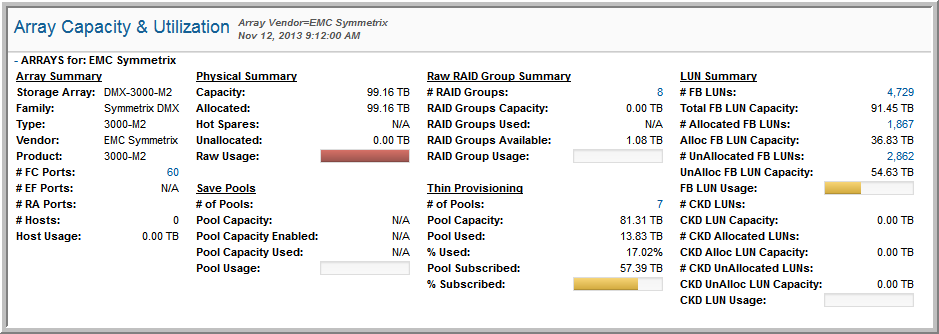

Storage Array | The name that you assigned to the array. Available values include all supported storage arrays. |
Family | The family classification of the storage array as assigned by the vendor. Use this name to ascertain the vendor’s product specifications. |
Type | The specific model of the storage array. |
Vendor | The name of the vendor that distributes the storage array. |
Product | The name of the product, typically shown as a series number. This field provides an indicator of capacity specifications, such as LUNs, hosts per array, and drives per array. |
# FC Ports | Number of Fibre Channel ports. Links to the Array Port Utilization report. |
# EF Ports | Number of EF - FICON (Fibre-ESCON) director ports. |
# RA Ports | Number of RA - RDF director ports. |
# Hosts | This is the total number of unique hosts that have LUNs assigned by this storage array, and the hosts have been successfully queried using one or more host resource policies. If zero, host resources data has not been collected. |
Host Usage | .Amount of capacity used by hosts. |
Physical Summary | |
Capacity | Sum of the capacity of all physical disks from all array groups, allocated, hot spares and unallocated. |
Allocated | Allocated storage is physical storage consumed, including parity overhead and system overhead. A gap between raw and allocated capacity may indicate unused capacity, such as drives in a rack that are not in use. |
Hot Spares | Total capacity of hot spare drives. |
Unallocated | Unallocated storage is storage that is not part of an Array Group |
Raw Usage | Expressed as a percentage, total capacity of the LUNs in the array that have been assigned to a host and that are not available for provisioning. |
Save Pools | |
# of Pools | Number of Save Pools for this storage array, representing the point-in-time copy of data |
Pool Capacity | Total physical capacity for all the Save Pools associated with this array. Note that Save Pool capacity can make the Total FB LUN Capacity appear inflated or duplicated. |
Pool Capacity Enabled | Amount of Save Pool capacity that has been enabled for host writes. |
Pool Capacity Used | Amount of the Save Pool capacity that has already been consumed by hosts. |
Pool Usage | Expressed as a percentage, this is the capacity of the Save Pools that has already been used by hosts. |
Raw RAID Group Summary | |
# RAID Groups | The number of array groups in the storage array. Links to List Array Groups. |
RAID Groups Capacity | Total capacity of the array groups in the storage array. |
RAID Groups Used | Total used capacity of the array groups (by LUNs) in the storage array. |
RAID Groups Available | Available capacity of the array groups in the storage array. |
RAID Group Usage | Thermometer with a tooltip that displays the percentage used. |
Thin Provisioning | |
# of Pools | Links to EMC Symmetrix Thin Pool Summary. |
Pool Capacity | Total capacity of the thin pool. |
Pool Used | Amount of thin pool capacity in the storage pools that is in use, not including LUNs that have not yet been physically allocated. |
% Used | Pool used divided by pool capacity = % used. |
Pool Subscribed | The physical capacity that has been given to hosts/applications; this is from the host’s perspective. |
% Subscribed | Amount of capacity that has been subscribed to users. |
LUN Summary | |
# FB LUNs | Number of FB (fixed block) LUNs. Links to the LUN Utilization Summary. |
Total FB LUN Capacity | Total capacity of all the FB (fixed block) LUNs for this array. See the Save Pool section of this report to verify capacity values. |
#Allocated FB LUNs | Links to the LUN Utilization Summary, which displays the allocated LUNs. |
Alloc FB LUN Capacity | Total storage capacity for the FB (fixed block) LUNs. |
# UnAllocated FB LUNs | The number of FB (fixed block) LUNs that have yet to be allocated. Links to the LUN Utilization Summary, filtered by unallocated LUNs. |
UnAlloc FB LUN Capacity | Total unallocated capacity for FB (fixed block) LUNs. |
FB LUN Usage | Mouse over the thermometer to view the percentage of the fixed block LUNs that are allocated. |
# CKD LUNs | Total number of Count-Key-Data (CKD) LUNs. |
CKD LUN Capacity | Total capacity of Count-Key-Data (CKD) LUNs. |
# CKD Allocated LUNs | Total number of allocated Count-Key-Data (CKD) LUNs. |
CKD Alloc LUN Capacity | Total allocated capacity of Count-Key-Data (CKD) LUNs. |
# CKD UnAllocated LUNs | Total number of unallocated Count-Key-Data (CKD) LUNs. |
CKD UnAlloc LUN Capacity | Total capacity of unallocated Count-Key-Data (CKD) LUNs. |
CKD LUN Usage | Mouse over the thermometer to view the percentage of the Count-Key-Data (CKD) LUNs that are allocated. |